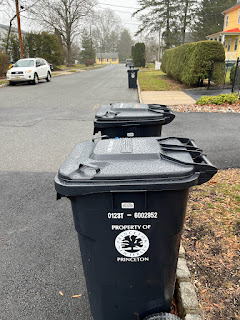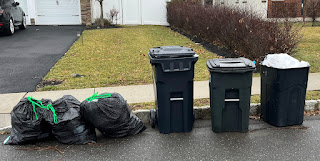When I lived in Michigan, the first ever Dominoes Pizza store was just down the road a bit, in Ypsilanti. Having moved long since to NJ, I was surprised to find a Dominoes Pizza box show up in our house, touting how recyclable it is. New Jersey, or at least Mercer County, has long told us that pizza boxes are not recyclable. What gives?
The best I can figure is that unstained pizza boxes were always recyclable, but that we're told not to recycle them because some boxes will have grease, cheese and leftover food still in them.
What Dominoes is touting is a study that showed that the stains and a few bits of food aren't enough of a problem to ban pizza boxes from the recycling stream.
An article in Sierra Club Magazine, citing the same study, supports that point of view.
The study was published three years ago, and we're still told not to recycle pizza boxes. Was the study proven wrong? Not according to an article in USA Today earlier this month. What's at stake is massive amounts of cardboard that can either be recycled or head to the landfill, where they will decompose anaerobically and produce climate changing methane, when they could instead be reducing the number of trees that need to be cut down to make more pizza boxes. To give a sense of scale, 13 million pizzas are sold on Super Bowl Sunday alone, according to the USA Today article. Cardboard is one of recycling's great success stories.
So, why are we still told not to recycle pizza boxes? Is the county worried that any food left in the pizza boxes will contaminate other recyclables? But food can sometimes be left in tin cans, and we're allowed to recycle those. Why are we trusted to remove food from cans and glass, but not pizza boxes?
The situation reminds me of a battle I waged ten years ago. Back then, we were told that envelopes with those cellophane windows were not recyclable. Well-meaning recyclers thus spent time tearing the windows out of envelopes so we could recycle the paper portion. Was it really necessary? I did research back then that showed that the windows are easily filtered out during recycling. I reported this to the recycling coordinator at the time, but nothing changed. The town website persisted in directing people not to recycle envelopes with windows. In retrospect, the town probably had to state whatever the county told them to. Ultimately, after much delay, the county changed its website to reflect the reality that envelopes with windows can in fact be recycled.
Dominoes says its pizza boxes dream of becoming more pizza boxes. But change comes slowly to the
Mercer County Improvement Authority, whose most recent news release was more than a year ago, stating that pizza boxes continue to not be recyclable. Whether for good reasons or bad, I doubt Mercer County will help that dream come true any time soon.
Postscript:
Here's the study's conclusion:
"The general conclusion of this work is that the strength loss of the resulting product made with recovered fiber that incorporates post-consumer pizza boxes should be minimal at typical levels of grease expected to be received in a recycling facility (<2%) and when included in the recovered fiber at expected levels of <3% of furnish. The addition of small amounts of cheese will not impact the fiber bonding in a negative way. It is expected that the larger chunks of cheese will be screened out of the process. Therefore, there is no significant technical reason to prohibit post-consumer pizza boxes from the recycle stream."














